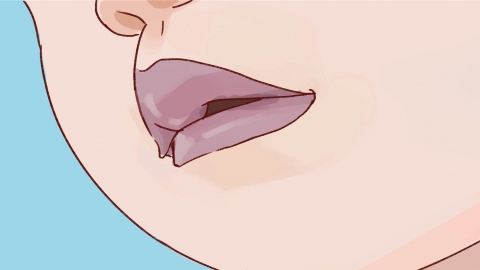Why do the lips turn blue when crying, and what should be done?
Generally, cyanosis of the lips during crying may be caused by emotional excitement, decreased body temperature, anemia, chronic obstructive pulmonary disease (COPD), heart failure, or other factors. Patients can receive treatments such as general therapy, medication, or surgical intervention under a doctor's guidance. If experiencing discomfort, prompt medical attention is recommended. Detailed analysis is as follows:

1. Emotional Excitement
During crying, emotional excitement may cause rapid and irregular breathing, leading to insufficient oxygen intake and decreased blood oxygen levels, which can cause the lips to turn blue. Learning to regulate emotions, avoiding excessive excitement, and maintaining steady breathing rhythms are recommended.
2. Decreased Body Temperature
When crying, tears evaporation and emotional fluctuations may slightly lower body temperature, causing peripheral vasoconstriction and slowed blood circulation. The lips may become cyanotic due to insufficient blood supply. Keeping warm and avoiding prolonged crying in cold environments is advised.
3. Anemia
Anemia typically occurs due to a reduced number of red blood cells or decreased hemoglobin levels. Anemia leads to reduced oxygen-carrying capacity of the blood, causing tissue hypoxia and resulting in cyanosis of the lips. Associated symptoms may include fatigue, dizziness, and palpitations. Patients may use medications such as Guipi Pills, Ejiao Blood-enriching Oral Liquid, or Fufang Ejiao Jiang under a doctor's guidance, while adjusting their diet to increase iron intake.
4. Chronic Obstructive Pulmonary Disease (COPD)
Chronic obstructive pulmonary disease is primarily caused by long-term smoking, air pollution, and other factors leading to airway narrowing and airflow limitation in the lungs. Impaired ventilation and gas exchange functions in the lungs result in systemic hypoxia, causing cyanosis of the lips. Symptoms may include coughing, sputum production, and shortness of breath. Patients may use medications such as Beclomethasone Dipropionate Inhalation Aerosol, Budesonide Inhalation Aerosol, or Doxofylline Tablets as prescribed by their doctor.
5. Heart Failure
Heart failure is usually caused by psychological factors, metabolic disorders, anemia, abnormal diet, or drug effects. Declined cardiac pumping function leads to insufficient tissue perfusion and hypoxia throughout the body, causing the aforementioned symptoms. Accompanying symptoms may include extreme fatigue and leg edema. Patients may require surgery under medical guidance, such as heart transplantation, which involves implanting a healthy heart to replace the damaged or failing one, thereby restoring blood circulation.
In daily life, maintaining a balanced diet, engaging in moderate exercise, ensuring adequate sleep and rest, and enhancing immune function are recommended to help prevent the occurrence of heart and respiratory diseases.







